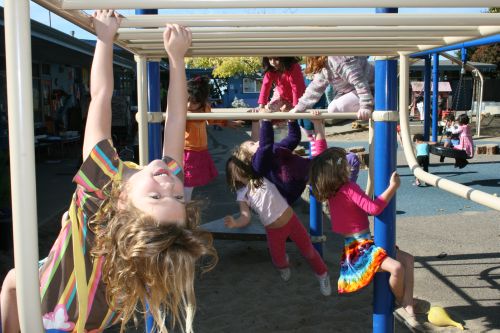In the Nursery School program, our teachers are “nurturing independence” among the 3 and 4 year olds. Keeping a watchful eye on the decisions and actions children are taking throughout their periods of free choice, teachers assume many roles—observer, facilitator, guide, leader and, at times, playmate.
Within each of the three nursery school classrooms, there are the same components in the daily schedule, which provide a predictable rhythm to the day:
Step One teachers consciously maintain a balanced curriculum, one that doesn’t overemphasize a particular area of development at the expense of others. All arenas of early childhood development—social, emotional, cognitive, physical, and aesthetic--have a valued place in the planning and implementation of our daily program. That said, a child’s socio-emotional development is the underpinning for all other areas, and as such, we place great value upon it. As changes in the children’s daily lives occur, modifications to the activities and conversations are made to incorporate these significant events in their learning.
We feel it's beneficial for the children to have a range of social experiences during the day - play in an unstructured group, a structured group (large and small), and the opportunity to play individually. Our low teacher: student ratio (1:8) is essential to providing an environment conducive to learning of all kinds.
Communication between teachers and parents occurs in a variety of planned and unplanned ways—conversations, notes, newsletters, and occasional emails and phone calls all help us to keep lines of communication open and serve teachers in understanding each child’s unique needs.
In young children’s ‘pre-logical’ stage of cognitive development, we have found that preschool aged children learn best through experimentation, independent play, building, and engaging in games and projects that they themselves find attractive and interesting. Through their play and social interactions, children learn about and act upon the world they live in, build concepts, and learn to express their feelings in effective and appropriate ways.
Within each of the three nursery school classrooms, there are the same components in the daily schedule, which provide a predictable rhythm to the day:
- A warm greeting
- Alternating periods of free play and free choice, both inside and outdoors
- A small group time* with peers of a similar age
- Scheduled bathroom visits for all children, whether they have mastered the use of the toilet or not
- A healthful snack mid-morning and mid-afternoon
- Circle gatherings* with the whole group
- Lunch time teachings
Step One teachers consciously maintain a balanced curriculum, one that doesn’t overemphasize a particular area of development at the expense of others. All arenas of early childhood development—social, emotional, cognitive, physical, and aesthetic--have a valued place in the planning and implementation of our daily program. That said, a child’s socio-emotional development is the underpinning for all other areas, and as such, we place great value upon it. As changes in the children’s daily lives occur, modifications to the activities and conversations are made to incorporate these significant events in their learning.
We feel it's beneficial for the children to have a range of social experiences during the day - play in an unstructured group, a structured group (large and small), and the opportunity to play individually. Our low teacher: student ratio (1:8) is essential to providing an environment conducive to learning of all kinds.
Communication between teachers and parents occurs in a variety of planned and unplanned ways—conversations, notes, newsletters, and occasional emails and phone calls all help us to keep lines of communication open and serve teachers in understanding each child’s unique needs.
In young children’s ‘pre-logical’ stage of cognitive development, we have found that preschool aged children learn best through experimentation, independent play, building, and engaging in games and projects that they themselves find attractive and interesting. Through their play and social interactions, children learn about and act upon the world they live in, build concepts, and learn to express their feelings in effective and appropriate ways.




 child in his class.
child in his class.